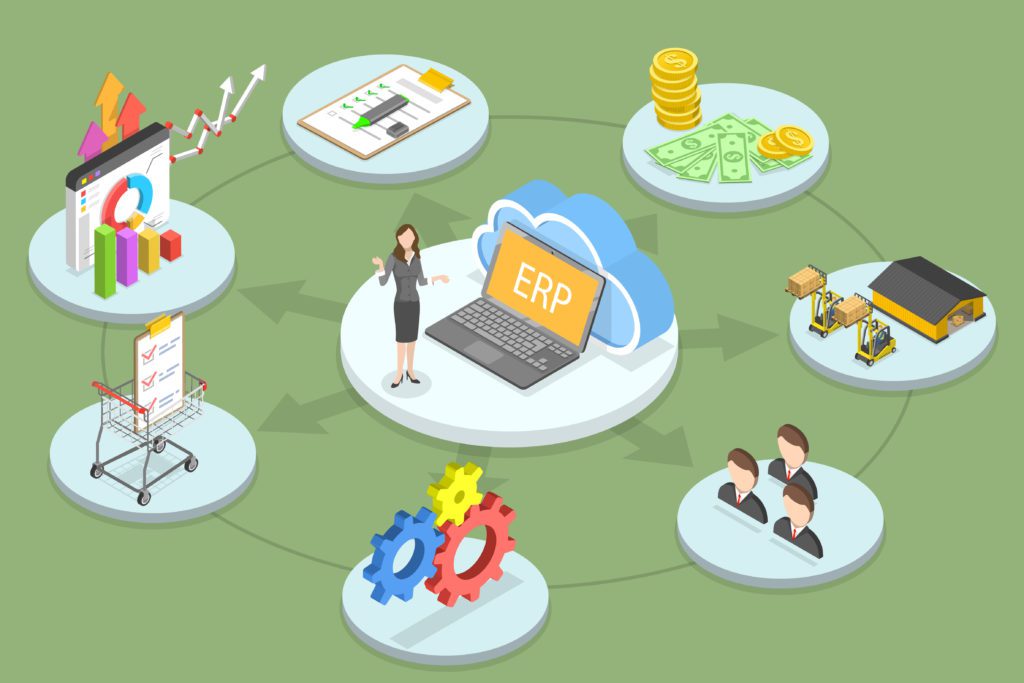
A variety of industries and enterprise models use enterprise resource planning (ERP) software to organize and better connect their business applications. With the help of ERP solutions, users can automate, integrate, and create more visibility into how business processes are running, all while eliminating unnecessary IT tool sprawl.
Despite all of the benefits of ERP, businesses run certain risks when they invest in ERP without full knowledge of what the tool can do and how it should be set up and used. Weighing the pros and cons of ERP software ensures that organizations invest the right time, cost, people, and resources into selecting a solution that works.
Pros of implementing an ERP solution
ERP platforms offer a variety of efficiencies to enterprise teams, with improved data quality and management, increased collaboration, and new app integrations to simplify workflows
Data quality and process standardization
Most instances of ERP software rely on single-source-of-truth mega-databases, which pull data from business applications that have been integrated into the ERP. This larger database consolidates data from applications like customer relationship management (CRM) platforms and human resources information system (HRIS) software, which collect data from a variety of business departments and use cases.
Having different user profiles and documentation stored in one place not only makes for easier navigation and administrative visibility but also improves data quality and process standardization. Users can catch and correct data errors that have proliferated in one application or departmental process based on standardized data sets in the ERP.
Compliance and administrative controls
Many ERP platforms include automated policy management support, and some include specific support for regulations like GDPR and HIPAA. Greater administrative visibility and control over enterprise apps, data, and workflows make it easier for an enterprise team to maintain security, assess performance, audit operations, and meet compliance requirements.
Better communication across teams and workflows
ERP provides new data and process sharing opportunities across departments. Teams get more visibility into how other teams use their tools as soon as they are integrated into the platform. With the right strategy, your company’s leaders should be able to identify inefficient processes in one group and realign them to more efficient processes on another team due to the visibility that ERP innately offers.
Longterm cost and tool reductions
Initial costs for ERP can be steep. However, ERP platform use typically reduces tool sprawl, workload needs for legacy tools, and employee headcount for certain kinds of work that can be automated.
Over the long term, companies typically save money and simplify their IT tool stacks. According to a recent study by Ultra Consultants and Mint Jutras, 82 percent of companies with a projected ROI timeline for ERP met or exceeded their time-to-ROI goals.
More holistic business intelligence and reporting
Uniting business apps, data, and workflows into one platform makes it easier to do accurate, holistic reporting. Consequently, tech teams can better understand their business application metrics and interpret that data to inform future goals across the company.
Enhanced customer experiences
ERPs increase automation and improve data quality across a variety of data types, including customer profiles. They also frequently include or integrate with CRMs. Better customer data knowledge and customer-focused features improve how customers engage with and receive communication from the company.
Learn more: How CRM and ERP Integration Can Benefit Your Business
Efficiency and automation across operational lifecycles
Simplified dashboards, data visualizations, automation, and other features in ERPs make it easier for different roles and teams to understand and optimize their operations.
Industry-specific software access
ERPs frequently offer industry-specific modules that can increase efficiencies and compliance for a given industry’s needs. Some industries that commonly work with industry-specific ERP systems and modules include manufacturing, healthcare, and foodservice.
Cons of implementing an ERP solution
The biggest problems that companies face when getting started with an ERP solution are underestimating the actual scope of work and not doing enough research on the time and costs that go into setting up a large enterprise app ecosystem.
Initial cost of the platform
ERP platforms are almost always expensive, especially for companies that have a lot of teammates, data storage needs, and different module needs. Many companies report that implementation costs three to four times more than they originally budgeted.
Cost of third-party implementation support
Few teams have enough in-house expertise to set up their ERP software exactly how they want it to work, so they rely on consulting partners to help them implement the tool. These partners’ fees can add up quickly, especially as they uncover new platform needs and extend timelines.
Complexity of modular customization
ERPs are typically very customizable, but many teams develop insufficient customizations or customizations that hurt the overall performance of the platform. Again, it’s important to work with support specialists or third-party consultants who specialize in this kind of implementation.
Lengthy deployment and implementation process
Because ERPs are frequently molded to exactly what a business needs, it takes a long time to customize the ERP and set it up for initial deployment. Many companies get frustrated by how long this process takes, and many underestimate the time and labor needed before their go-live. The biggest problems with time and cost usually happen because internal implementation teams severely underestimate scopes of work and needed customizations.
Preparing your ERP for success: How to Develop an ERP Business Continuity Plan
Is ERP right for you?
With so many moving parts in the launch of ERP for business, there will always be unexpected pros and cons that arise in the process. The pros should outweigh all cons, especially when a team makes thoughtful decisions about what ERP solution they need and how it needs to be set up. Choosing the right ERP and deploying it successfully can be a challenge, but many resources are available to enterprises to ensure they see all of the benefits of ERP in the long term.
Learn about some top ERP solutions on the market: Best ERP Systems: Compare Top Vendors